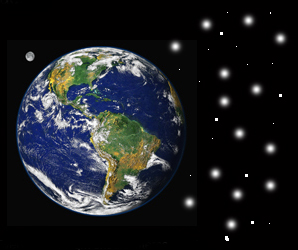Olbers' Paradox
In 1823, the German astronomer Heinrich Wilheml Olbers begged the question: Why is the night sky dark, when in an infinite, static universe, the night sky ought to be bright?

In an infinite, static universe, every line of sight should eventually intersect with a star.
If the universe is indeed infinite, then there should be at least one star at every visible point in the sky lighting it up in all directions. Imagine standing at the center of a very thick forest: there is always a tree in your line of sight, regardless of what direction you are facing. If the universe was infinite, we would similiarly see the light of a star at every point in the sky--this would also imply that the night sky would be blindingly bright with the light of infinite stars.
However, this is clearly not the case as our night time sky is (as you may have noticed) in fact dark. This paradox provides evidence that the universe is either expanding or has a finite history.